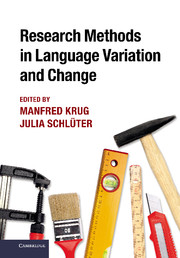Book contents
- Frontmatter
- Contents
- List of Figures
- List of Tables
- List of Contributors
- Preface
- Acknowledgements
- Introduction: Investigating language variation and change
- Part 1 Collecting empirical data
- Part 2 Analysing empirical data
- Part 2.1 Corpus analysis
- 9 Using ‘small’ corpora to document ongoing grammatical change
- 10 Using tag sequences to retrieve grammatical structures1
- 11 Categorizing syntactic constructions in a corpus*
- Part 2.2 Phonetic and phonological analysis
- Part 2.3 Combinations of multiple types of data
- Part 3 Evaluating empirical data
- Bibliography
- Index
- References
9 - Using ‘small’ corpora to document ongoing grammatical change
Published online by Cambridge University Press: 05 June 2014
- Frontmatter
- Contents
- List of Figures
- List of Tables
- List of Contributors
- Preface
- Acknowledgements
- Introduction: Investigating language variation and change
- Part 1 Collecting empirical data
- Part 2 Analysing empirical data
- Part 2.1 Corpus analysis
- 9 Using ‘small’ corpora to document ongoing grammatical change
- 10 Using tag sequences to retrieve grammatical structures1
- 11 Categorizing syntactic constructions in a corpus*
- Part 2.2 Phonetic and phonological analysis
- Part 2.3 Combinations of multiple types of data
- Part 3 Evaluating empirical data
- Bibliography
- Index
- References
Summary
Introduction
The present chapter asserts the continuing relevance of a methodology which has gone out of fashion with some segments of the corpus-linguistic community: the careful and – dare we use the dreaded word: philological – analysis of small corpora with a balanced mix of quantitative and qualitative methods. This mix of methods reflects the twin advantages of the use of corpus data in linguistic description. On the one hand, corpus data are good data because they often come in large amounts, therefore encouraging quantification and statistical modelling. Expanding corpus sizes and increasing the sophistication of statistical analyses have been priorities in the past few decades of corpus-linguistic research; and the progress made has been remarkable (for illustration, it is sufficient to refer to the chapters in Parts 1.3, 2.1 and 3.2 of this volume). On the other hand, corpora are also good data because they present authentic records of individual written or spoken acts of communication in their original discourse contexts and thus encourage the qualitative study of complex verbal interaction. The current corpus-linguistic mainstream tends to be more aware of the first advantage than the second. However, if properly analysed, even a small number of examples obtained from small corpora can add considerably to our knowledge of change and variation in the English language, as will be shown below using the example of a currently ongoing shift from the to-infinitive to the bare infinitive in constructions of the type what I did was to find him a new job → what I did was find him a new job. If you can only obtain dozens rather than thousands of examples – a situation not uncommon in the study of spoken language or of historical data – this need not be a cause for despair.
- Type
- Chapter
- Information
- Research Methods in Language Variation and Change , pp. 181 - 194Publisher: Cambridge University PressPrint publication year: 2013
References
- 2
- Cited by



